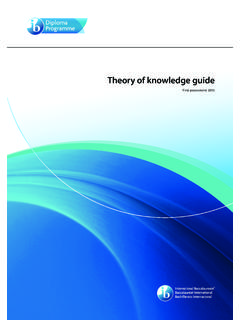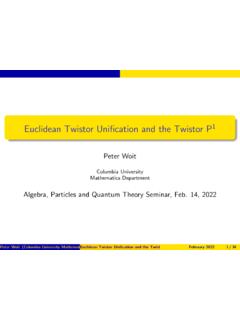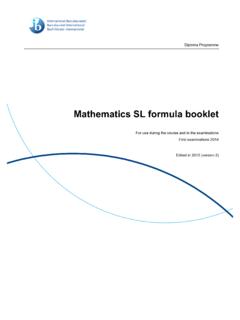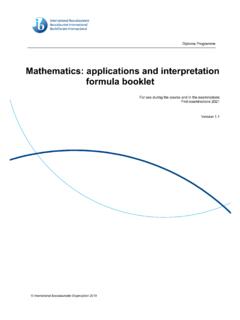Transcription of Mathematics: analysis and approaches guide
1 mathematics : analysis and approaches guideMathematics: analysis and approaches guideInternational Baccalaureate, Baccalaur at International, Bachillerato Internacional and IB logos are registered trademarks of the International Baccalaureate OrganizationDiploma ProgrammeMathematics: analysis and approaches guidePublished February 2019 Published on behalf of the International Baccalaureate Organization, a not-for-profit educational foundation of 15 Route des Morillons, 1218 Le Grand-Saconnex, Geneva, Switzerland by theInternational Baccalaureate Organization (UK) Ltd Peterson House, Malthouse Avenue, Cardiff Gate Cardiff, Wales CF23 8GL United Kingdom Website: International Baccalaureate Organization 2019 The International Baccalaureate Organization (known as the IB) offers four high-quality and challenging educational programmes for a worldwide community of schools, aiming to create a better, more peaceful world.
2 This publication is one of a range of materials produced to support these IB may use a variety of sources in its work and checks information to verify accuracy and authenticity, particularly when using community-based knowledge sources such as Wikipedia. The IB respects the principles of intellectual property and makes strenuous efforts to identify and obtain permission before publication from rights holders of all copyright material used. The IB is grateful for permissions received for material used in this publication and will be pleased to correct any errors or omissions at the earliest rights reserved.
3 No part of this publication may be reproduced, stored in a retrieval system, or transmitted, in any form or by any means, without the IB s prior written permission, or as expressly permitted by the Rules for use of IB Intellectual merchandise and publications can be purchased through the IB Store (email: Any commercial use of IB publications (whether fee-covered or commercial) by third parties acting in the IB s ecosystem without a formal relationship with the IB (including but not limited to tutoring organizations, professional development providers, educational publishers and operators of curriculum mapping or teacher resource digital platforms etc) is prohibited and requires a subsequent written license from the IB.)
4 License requests should be sent to More information can be obtained on the IB public mission statementThe International Baccalaureate aims to develop inquiring, knowledgeable and caring young people who help to create a better and more peaceful world through intercultural understanding and this end the organization works with schools, governments and international organizations to develop challenging programmes of international education and rigorous programmes encourage students across the world to become active, compassionate and lifelong learners who understand that other people, with their differences, can also be learner profile Iprofile IB learner parner profile IB leaile IB learner profiIB learner profile Ier profile IB learne Inter national Baccalaureate Organization 2017 Inter national Baccalaureate | Baccalaur at I nter national | Bachillerato Inter nacional The IB learner pro le represents 10 attributes valued by IB World Schools.
5 We believe these attributes, and others like them, can help individuals and groups become responsible members of local, national and global nurture our curiosity, developing skills for inquiry and research. We know how to learn independently and with others. We learn with enthusiasm and sustain our love of learning throughout develop and use conceptual understanding, exploring knowledge across a range of disciplines. We engage with issues and ideas that have local and global signi cance. We use critical and creative thinking skills to analyse and take responsible action on complex problems. We exercise initiative in making reasoned, ethical express ourselves con dently and creatively in more than one language and in many ways. We collaborate e ectively, listening carefully to the perspectives of other individuals and act with integrity and honesty, with a strong sense of fairness and justice, and with respect for the dignity and rights of people everywhere.
6 We take responsibility for our actions and their critically appreciate our own cultures and personal histories, as well as the values and traditions of others. We seek and evaluate a range of points of view, and we are willing to grow from the show empathy, compassion and respect. We have a commitment to service, and we act to make a positive di erence in the lives of others and in the world around understand the importance of balancing di erent aspects of our lives intellectual, physical, and emotional to achieve well-being for ourselves and others. We recognize our interde-pendence with other people and with the world in which we thoughtfully consider the world and our own ideas and expe-rience. We work to understand our strengths and weaknesses in order to support our learning and personal approach uncertainty with forethought and determination; we work independently and cooperatively to explore new ideas and innovative strategies.
7 We are resourceful and resilient in the face of challenges and learner profileThe aim of all IB programmes is to develop internationally minded people who, recognizing their common humanity and shared guardianship of the planet, help to create a better and more peaceful IB learners we strive to be:THE IB LEARNER PROFILEI ntroduction1 Purpose of this document1 The Diploma Programme2 Nature of Mathematics6 approaches to the teaching and learning of mathematics : analysis and approaches13 Aims22 Assessment objectives23 Assessment objectives in practice24 Syllabus25 Syllabus outline25 Prior learning topics26 Syllabus content28 Assessment70 Assessment in the Diploma Programme70 Assessment outline SL72 Assessment outline HL73 External assessment74 Internal assessment80 Appendices89 Glossary of command terms89 Notation list91 ContentsMathematics: analysis and approaches guideThis publication is intended to guide the planning, teaching and assessment of the subject in schools.
8 Subject teachers are the primary audience, although it is expected that teachers will use the guide to inform students and parents about the guide can be found on the subject page of the programme resource centre at , a password-protected IB website designed to support IB teachers. It can also be purchased from the IB store at resourcesAdditional publications such as specimen papers and markschemes, teacher support materials, subject reports and grade descriptors can also be found on the programme resource centre. Past examination papers as well as markschemes can be purchased from the IB are encouraged to check the programme resource centre for additional resources created or used by other teachers. Teachers can provide details of useful resources, for example websites, books, videos, journals or teaching IB wishes to thank the educators and associated schools for generously contributing time and resources to the production of this assessment 2021 IntroductionPurpose of this document1 mathematics : analysis and approaches guideThe Diploma Programme is a rigorous pre-university course of study designed for students in the 16-19 age range.
9 It is a broad-based two-year course that aims to encourage students to be knowledgable and inquiring, but also caring and compassionate. There is a strong emphasis on encouraging students to develop intercultural understanding, open-mindedness, and the attitudes necessary for them to respect and evaluate a range of points of Diploma Programme modelThe course is presented as six academic areas enclosing a central core (see figure 1). It encourages the concurrent study of a broad range of academic areas. Students study two modern languages (or a modern language and a classical language), a humanities or social science subject, an experimental science, mathematics and one of the creative arts. It is this comprehensive range of subjects that makes the Diploma Programme a demanding course of study designed to prepare students effectively for university entrance.
10 In each of the academic areas students have flexibility in making their choices, which means they can choose subjects that particularly interest them and that they may wish to study further at 1 The Diploma Programme modelIntroductionThe Diploma Programme2 mathematics : analysis and approaches guideChoosing the right combinationStudents are required to choose one subject from each of the six academic areas, although they can, instead of an arts subject, choose two subjects from another area. Normally, three subjects (and not more than four) are taken at higher level (HL), and the others are taken at standard level (SL). The IB recommends 240 teaching hours for HL subjects and 150 hours for SL. Subjects at HL are studied in greater depth and breadth than at both levels many skills are developed, especially those of critical thinking and analysis .











